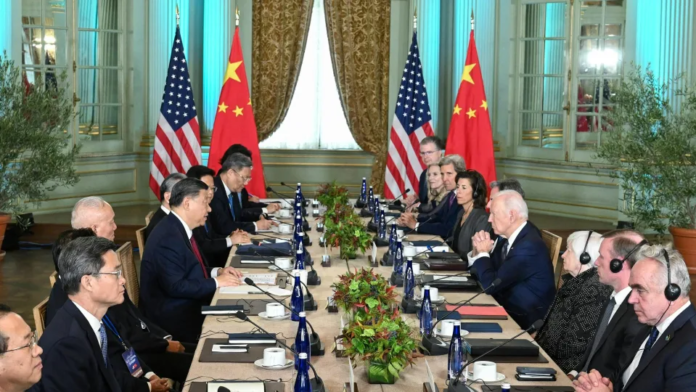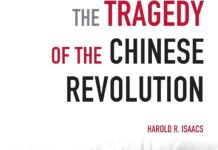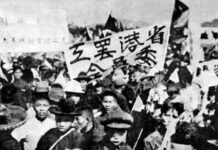This article is an excerpt from a speech given by Vincent Kolo of chinaworker.info to socialists in South Korea
Under imperialism each major power tries to weaken its rivals by economic but also by military pressure. The struggle over Taiwan is an example. Taiwan’s people are in the very unfortunate position to be a geopolitical chess piece in the US-China imperialist conflict. There could be a war, which would risk a horrific conflagration and could draw in not only the US against China, but also Japan, Australia, the Philippines, possibly South Korea and several NATO countries on the US side. And Russia and possibly North Korea on China’s side.
Marxists are not doomsday prophets of a Third World War. But like Lenin and Trotsky we explain that war is inevitable under imperialism. We explain what political alternative is needed to stop this development. We warn against “lesser evilism” – to support the “least bad” imperialism. That would not put a brake on military conflict and would be disastrous in its political impact on the workers’ movements.
A Taiwan war is not a likely perspective in the near term, thankfully. The factors that could trigger a war are widely misunderstood as a result of the tsunami of propaganda from capitalist regimes on both sides. Does China’s dictatorship harbour the ambition to take control of Taiwan? Yes, but this does not mean that Xi Jinping or the PLA are ready or anxious to initiate war in the short term. Right now, a major factor that deters Xi Jinping from launching an invasion is that militarily it would carry a high risk of failure. This is due to Taiwan’s terrain, the weather conditions, and the complexity of conducting an amphibious landing on such a gigantic scale. Many things could go wrong. This is despite China’s considerable military advances. It now has the world’s largest navy, with 370 military vessels compared to America’s 280. The US fleet is more advanced, carries more powerful weapons. But China builds three warships for every one the US builds.
Global slump
Military factors are not the most important factors that hold the Chinese regime back from an attack on Taiwan. Despite its propaganda and virulent online nationalism, the idea that there is mass pressure upon the regime to “take back” Taiwan is not true. There is little support for war among the masses. A Taiwan war would trigger a global economic slump, with world GDP falling by 10 percent according to Bloomberg Economics. This would inflict massive damage on China’s economy which is already in a severe crisis facing economic “Japanification”.
A further key factor is political. If we assume that China could accomplish the military conquest of Taiwan, how would it rule the island’s 23 million people? This is not Hong Kong. And in Hong Kong after 25 years of pseudo “democratic” rule, China was forced to impose the harsh police dictatorship we see today. Hong Kong’s people are now almost completely alienated from Beijing’s rule and would be the first to celebrate if it lost a war over Taiwan. 40 percent of Hong Kong people want to emigrate according to polls.
The crushing of Hong Kong’s mass democracy struggle, its trade unions and opposition parties, and establishment of a police regime, has fundamentally weakened the pro-CCP/pro-China forces in Taiwan. Recruiting to a “quisling” regime to run Taiwan on behalf of Beijing would be no easy feat. To rule Taiwan, China would be forced to commit massive military resources, a permanent garrison of perhaps 200,000 soldiers or more, which would be a further unbearable drain on China’s debt-laden public finances. On top of this it would face mass hatred, civil disobedience and even possibly a military insurgency, probably funded by US imperialism.
US sphere of control
These are all factors that weigh powerfully against any thoughts in Xi Jinping’s head of invading Taiwan. We have always challenged this idea, that the threat to Taiwan’s peace and security comes primarily from Beijing’s desire to unify “by force if necessary”. The danger of war comes from a different dynamic altogether.
The Chinese dictatorship does not need to make good on its rhetoric to “crush separatist forces”, so long as the situation broadly remains as it is today, in a stalemate. Beijing can live with a Taiwan that is outside of its formal control so long as Taiwan does not become fully integrated into the US sphere of control. That could be changed by several events, which worryingly are being contemplated by the most belligerent right-wing sections of US imperialism. These possible policy changes include a) formal recognition of Taiwan as a separate state b) stationing US troops on the island c) signing a formal defense treaty or conferring “allied” status on Taiwan.
Another factor could be a spontaneous mass movement in Taiwan behind the demand for formal independence. Unless this mass movement and its leadership was independent of the capitalist parties, which are all of course pro-imperialist in one form or another, this would risk being hijacked by the Taiwanese capitalists, the US and Japan, and would provoke a military response from China.
Under the above-mentioned conditions therefore, the Chinese regime could be forced to launch an attack on Taiwan, despite fearing the terrible consequences and costs. From the standpoint of the Chinese ruling class, failure to do so under such conditions would risk humiliation and likely regime collapse.
It would reinforce and fire up the centrifugal tendencies inside China, with pressure building in Xinjiang, Tibet, Hong Kong and elsewhere, to “follow Taiwan” and break from Beijing’s control. Today’s dangerous stalemate in the Taiwan Strait also does not mean that a military conflict between China and one or more allies of US imperialism could not break out in the next period.
We see the escalation of conflict in the South China Sea especially between Beijing and the Marcos government in the Philippines, which is allied with the US. China’s stand on the disputed islands and reefs is blatantly imperialist: It wants almost the whole South China Sea. Thanks to the clumsy arrogant policies of the Chinese regime, the US has been able to manipulate the South China Sea issue to its advantage, with increased militarization and upgraded alliances. Within the New Cold War some regimes shift towards the US and others shift in the opposite direction, as we saw with the Maldives and also in the Pacific Islands like Nauru, Solomon Islands and Fiji. These governments try to play the two blocs off against each other to gain investment and other benefits.
The election of Marcos in the Philippines has meant a significant setback for Beijing in favour of the US. With increased military support from the US and Japan, Marcos has taken a harder line against China over disputed islands. The two sides have clashed in the South China Sea using water cannons, lasers, and ships ramming into each other. While so far, this has not escalated into military action, the rhetoric and threats from both sides are escalating.
Overstretched with its involvement in two big wars, Ukraine and Gaza, the US does not want to provoke a conflict with China right now in the South China Sea. Under other conditions such a conflict might appeal to one or other of these regimes as a “limited” military clash that could teach the other side a lesson without getting out of control.
Rising nationalism
But the situation gets more complicated because the interests of local regimes do not always fully overlap with their big imperialist sponsors. Marcos’ popularity surged from 43% to 58% at the end of 2023 on the basis of his more defiant rhetoric against China. A March poll said that 75% of Filipinos were ready to fight “if there was a conflict between the Philippines and a foreign country”.
Marcos angered Beijing by being one of the first leaders to congratulate William Lai Ching-ti on winning Taiwan’s presidential election. In an interview with Japanese media he said the Philippines by dint of its proximity would inevitably be drawn into any military conflict over Taiwan. A military exchange or incident between China and the Philippines cannot be excluded despite the fact that Beijing and Washington are not seeking this right now. Such a conflict can in turn have important repercussions on mass consciousness in the wider region, not least in Taiwan.
ISA and Marxists stand for the right of self-determination for the people of Taiwan, the big majority of whom do not want to be part of a Chinese state. Democratic consciousness is of course a vital question for Marxists as it was in Russia, where the 1917 revolution began under the slogan “Down with the dictatorship!”.
Likewise on the issue of Taiwan’s independence, we say this struggle must begin by winning independence from all the capitalist parties including the fake “pro-independence” DPP – today’s ruling party. The struggle for independence can only succeed as a socialist struggle, with workers in Taiwan linking with workers in China and across the region.
The struggle for Taiwan independence can only win with the destruction of capitalism and mass struggle against all imperialism: American, Japanese and Chinese imperialism, etc.




